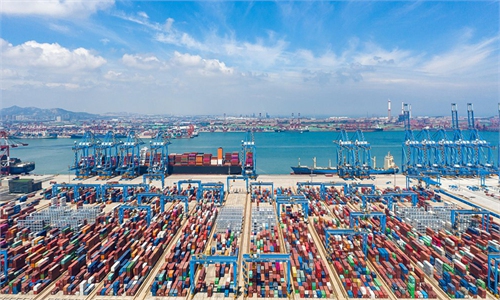
Photo: VCG
Whenever China's economic development hits a snag, discussions about "foreign companies' withdrawal from China" will inevitably surface in Western political and economic circles. But once the Chinese economy gets through the difficulties, the badmouthing dies down, and one will find that foreign investment in China is still growing and thriving.Every few years, this scenario happens, which is proof that despite geopolitical risks and economic challenges, China's consumer market, investment environment and supply chain ability are incomparable attractions for foreign companies in the long run.
According to an annual survey released on Tuesday by the American Chamber of Commerce (AmCham) in Shanghai, as geopolitical tensions and a slowing economy hurt sentiment, only 52 percent of the 325 American companies polled this summer said they remained optimistic about the five-year outlook of doing business in the country.
That was the lowest level of optimism reported since the AmCham Shanghai Annual China Business Report was introduced in 1999.
While the survey may seem to add fuel to the recent US hype of belittling China's development prospects and playing up the exit of foreign investment from China, there were still bright spots. About one-third of respondents said they plan to increase investment in China this year, a bit more than last year.
There has been no shortage of US media reports about "foreign capital leaving China" and "declining investment willingness in China" in recent days, a new round of concentrated badmouthing of the Chinese economy.
They are actually a form of cognitive and psychological warfare launched by the US against China, targeting the confidence in China's economy, with the purpose of deterring foreign investment and having a substantial impact on the economy.
There is no denying that the US push for "decoupling" and uncertainties in China-US relations have affected the business decisions and investment plans of some American companies, but does it really mean that China will lose its appeal for foreign investment? Not necessarily.
Data released by the Ministry of Commerce may offer a glimpse into the changes in China's foreign investment situation. Although foreign direct investment (FDI) in the Chinese mainland in actual use declined 5.1 percent year-on-year to 847.17 billion yuan ($118 billion) in the first eight months of the year, FDI in high-tech manufacturing jumped 19.7 percent, indicating an improved quality of Chinese industries in terms of drawing foreign investment.
This increase proves that China remains an important player in the rebalancing process of global value chains, and instead of being marginalized, the country has actually drawn more and more attention in high-tech industrial chains.
Despite efforts by the Biden administration to wean supply chains away from Beijing, not only are most countries and markets being rational, but many American industrial and technology giants such as Microsoft, Qualcomm and Nvidia have also made rational decisions in front of the huge and irreplaceable Chinese market.
This explains why despite the challenges from geopolitics, there is every reason to believe that most foreign companies will choose to stay in China. As the world's second-largest economy, China has a huge consumer market, and leaving would mean the loss of consumer groups that are critical to profit growth and market share.
Also, China is an important manufacturing hub. An exit from China will lead to talent losses and disruptions to normal production, which will have a significant impact on business operations and efficiency.
Most importantly, whether the West recognizes it or not, China's investment climate has improved dramatically. Chinese authorities have launched a series of policies to demonstrate an open attitude toward foreign investment this year, with the negative list being cut continuously.
Any company that fails to identify China's growth potential and is swayed by those who focus on undermining confidence in the Chinese economy will lose the opportunity to benefit from China's policy dividends and consolidated supply-chain resilience.


